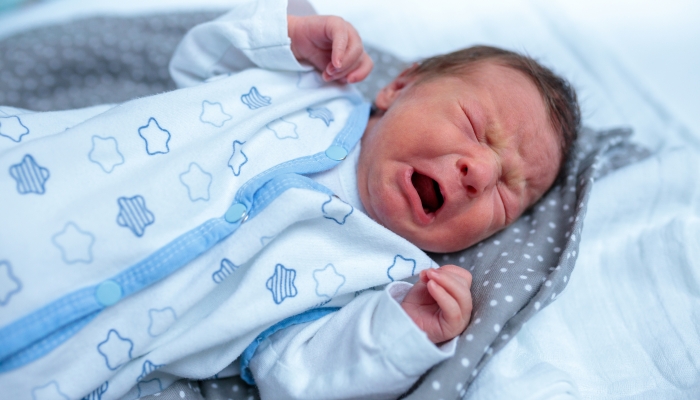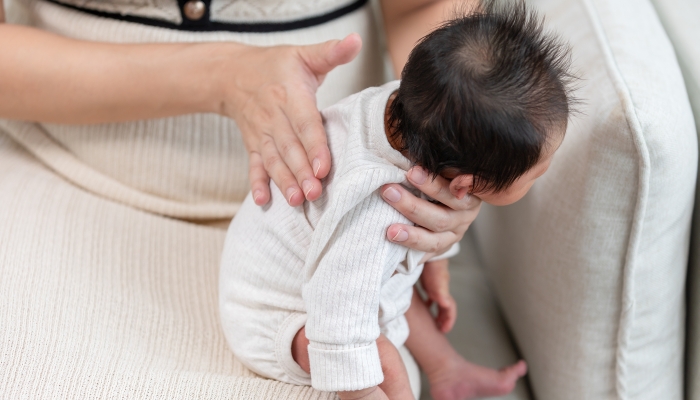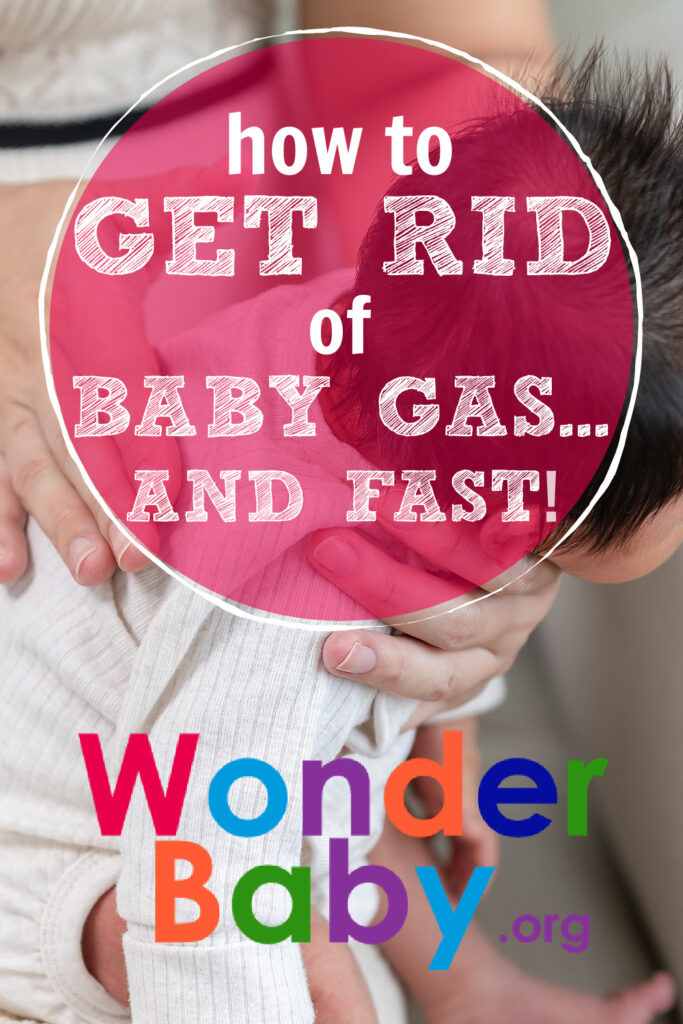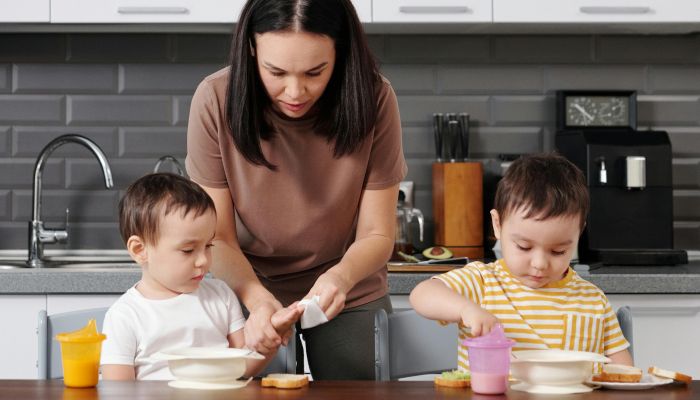How to Get Rid of Baby Gas… and Fast!

- It’s normal for young babies to struggle with passing gas as their digestive systems develop.
- Gassy babies can be fussy, may cry a lot, and may squirm in discomfort after feeding, which is distressing for parents, but these symptoms should ease when babies pass gas.
- You can try many things to relieve a gassy baby, like changing feeding and burping positions, changing formula, and encouraging tummy time.
The crying and screaming of a young baby struggling to pass gas can be surprisingly loud and distressing. In addition, babies’ brand-new digestive systems often struggle to deal with trapped gas bubbles in the early weeks and months.
Gassiness leads to fussiness, which is normal for breastfed and bottle-fed babies. Feeding should be a lovely bonding time between caregiver and baby. However, gas pain in your baby’s tummy with crying after every feeding can leave you dreading the next time.
Luckily, there are lots of different things that parents can try to relieve baby gas. The good news is that this difficult period with gas in your baby’s life will end soon.
How to Tell If Your Baby Has Gas
It’s not always easy to tell why a newborn baby might be fussy, but gas is often the culprit. Infant gas might be to blame if your baby is dry and fed but continues to cry, be fussy, and is generally unhappy.
Some signs your baby may be struggling with infant gas include:
- They often cry and seem like they’re in pain.
- They’re fussy and cry for more than an hour every day.
- They’re having trouble eating or sleeping well.
- They’re squirming and pulling their legs up to their chest.
Although most of these symptoms could also signify other issues your baby may be dealing with, like colic, helping your baby deal with trapped gas may be a good first step.

What Are the Causes of Baby Gas?
It’s helpful to know the causes of a gassy baby so you can stop it before it triggers a meltdown. Check out some of the most common causes of baby gas pains below:
| Cause | How it Creates Baby Gas |
| Brand new, immature digestive system | In their first two to three months of life, infants have to get used to their digestive system. When they eat, they swallow air, and food passes through them quickly. Their little digestive system may not effectively digest foods yet. |
| Swallowing too much air when feeding or crying | Babies may swallow excess air when breastfeeding or bottle feeding before they get the hang of it. They also swallow air when they cry. During a prolonged period of crying, more air is swallowed, which needs to escape and can cause baby gas pains. |
| Hypersensitivity to breastmilk or formula | Certain foods a breastfeeding mother eats and passes into her milk may cause gas in her infant. Some formulas may also not agree with your baby. Testing hypersensitivity as a reason for gas is a trial and error process. |
How to Get Rid of Baby Gas Fast
If you think gas may be why your fussy baby is having a lot of crying jags, there are a few things that can help them expel trapped gas.
Feeding Position
Whether bottle or breastfeeding, try holding your baby in a more upright position while they’re feeding. This can help to control the milk flow and amount of air that enters your baby’s tummy as they swallow.
Burping Position and Frequency
Try burping your baby in a more upright position, especially if your baby won’t burp easily.
Burping during feeds, not just at the end, may also be helpful. If they turn their head, are latching and unlatching repeatedly, or if they turn away early on in a feeding, gas may be the problem. A gentle burp along the way during feeding may be just the help they need to relieve gas buildup.
Try the Bicycle
You can try to help baby pass gas with this move. Relieve painful gas by laying your baby on their back and gently moving their legs around in a circle. Then, pump baby’s legs back and forth like a bicycle. Sometimes this lower body movement can help release excess gas.
Tummy Time
When your baby is awake, spending some time on their tummies every day is important for many reasons. Not only does it build their neck and back strength, but slight pressure on their stomachs can provide gas relief too.
Changing Mom’s Diet
If you’re breastfeeding or giving your baby expressed milk and notice they’re particularly fussy, you should consider what you’ve eaten. If your baby seems especially fussy after you’ve eaten certain foods, there might be a link.
Breastfeeding and expressing moms can try eliminating foods from their diet to see if a change in breast milk makes a difference to their baby’s gas. However, don’t eliminate too many things from your diet at once.
You can experiment with removing one or two foods, but remember that you need a full complement of nutrients in your diet when making milk for you and your baby to stay healthy.
Changing Formula
If you’re feeding your baby with formula, you may want to try changing brands to see if your child has a different reaction. There may be something that doesn’t agree with them in your chosen brand.
Remove Air Bubbles in Formula and Breast Milk
Consider switching from the powdered formula you mix yourself to a pre-mixed, ready-made formula. The shaking involved in making up powdered formula adds air bubbles to the milk, which your baby then swallows.
Similarly, if you express milk, you may see air bubbles in breast milk due to how it has been handled or stored or from soap residue. Try stirring it with a spoon or storing it in breast milk bags that vacuum seal to remove air.
Changing Your Bottle
There are so many options in bottles and bottle nipples now that you might want to try different styles to see if they suit your gassy baby better. Try a specifically designed anti-gas bottle and bottle nipple that may help your baby swallow less air when they’re feeding.
Feed Your Baby Before the Frantic Hunger Cry
With time you will learn your baby’s early hunger cues. Pay attention to these and feed your baby before they start a long hunger crying spell, a baby’s version of being “hangry.” The more a baby cries, the more air they swallow, and the more baby’s gas gets trapped and painful.
It can be difficult to know the early hunger cues at first, so don’t be too hard on yourself if your baby is crying down the house before you figure out what they need. However, as soon as you know your baby is hungry, feed them before a meltdown starts for preemptive baby gas relief.
Try Gripe Water
Gripe water is a natural remedy many parents and pediatricians will recommend for relieving baby gas. It usually contains ingredients like chamomile, ginger, and peppermint to naturally soothe baby’s stomach.

Is It Safe to Use OTC Baby Gas Drops?
You’ve tried infant massage, changing formula, and a warm bath. You’ve changed bottles. If you’re breastfeeding, you may have altered your diet. You’ve been burping during feedings and after, but nothing seems to be working.
Your baby is still crying and fussy before and after feedings. Some mothers swear by over-the-counter baby gas drops, and you’re tempted to try them, but are they safe?
What is Simethicone?
The primary ingredient in baby gas drops is simethicone, a chemical that breaks up gas bubbles. It makes your baby’s gas bubbles smaller and easier for them to pass.
Baby gas drops come with a stopper that helps you measure the dose and administer it to your baby before their feeding. You should give it to your baby slowly in the side of their mouth.
Gas drops are safe for babies and safe to use every day, according to experts at the Cleveland Clinic. However, you should speak to your doctor before you begin using them regularly with your infant and check on the dosage per day.
While simethicone is safe, make sure that the drops you choose do not contain benzoate or benzoic acid, which are harmful.
What if Gas Drops Don’t Seem to Be Working?
If you find that baby gas drops work for your baby, you should use them. If they don’t seem to have an effect, discontinue use.
If your baby continues to be fussy and unhappy with long periods of crying, you may want to investigate the possibility of colic. Baby gas drops, unfortunately, have no proven effect on colicky babies.
When to Bring Your Baby to the Doctor
If your baby’s pain and discomfort do not seem to ease, it may be time to speak to a medical professional for some advice.
When to Seek Urgent Medical Attention
You should seek urgent medical attention for a baby when:
- Your baby is younger than two months and has a fever.
- Your newborn baby is refusing to eat.
- There is blood in your baby’s stool.
- You think your baby is in pain and may have an injury.
- Your baby has hives, rash, swollen face, or difficulty breathing, which are signs of an allergic reaction.
When to See Your Pediatrician
You should call your baby’s doctor when:
- Your baby has gas and diarrhea after feeding, which may indicate food allergy or intolerance.
- Your baby is losing or not gaining weight.
- Your baby seems to have severe pain and discomfort after eating, which may require a change in diet.
- Your baby is spitting up or frequently vomiting after feeds, which may indicate gastroesophageal reflux (GER).
FAQ’s
How can I tell the difference between gassiness and colic?
Although fussiness due to gas and fussiness from colic may seem similar, they are two distinct conditions.
Prolonged crying due to colic usually begins around the same time every day. Generally, the “rule of three” indicates symptoms of colic:
- Crying for more than three hours a day.
- These crying periods happen more than three days per week.
- The crying spells have continued this way for more than three weeks.
If you suspect colic, seek your pediatrician’s advice on how to deal with it. Colic has no long-term adverse effects on your baby. However, it can be a distressing time for parents and babies until it passes, so it’s important to seek help and support.

Related Posts

Parenting
Sensory Wall Art: 5 Tips to Create a Room Your Blind or Low-Vision Child Will Love
Even if your child can’t see their surroundings, personalizing and decorating their room with thoughtful, sensory-friendly design can make a big difference in their confidence, independence, and joy.

Parenting
4 Tips to Manage Twins Alone as a Single Parent
Taking care of twins alone as a single parent can feel overwhelming. Learn practical ways to help lighten the load.

Parenting
How to Manage Twin Escalation Syndrome
Discover effective strategies for managing twin escalation syndrome, including promoting individuality and fostering positive interactions.